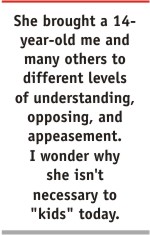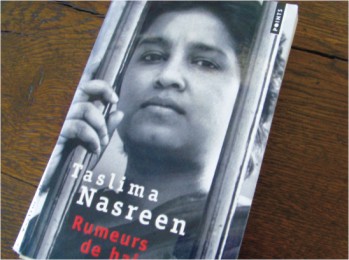
Inside
|
My Main Bane
Oh sister, when I come to lie in your arms Farah Mehreen Ahmad points the finger at women who oppress women I don't wake up to Sultana's Dream every day. I wake up to my own very rose-tinted, idealistic, maybe even immature daydream of a perfect, balanced, free, equal and generally hatred-free world, where disparities are eradicated, and battles are fought in unity. Wow, that made me queasy the way bubble-gum pop music does. But the good thing is, there are many interruptions to my daydreams. Or should I call them reality-checks? So what are they? The ones who intrigue me are the ones who devalue themselves. The ones who sadden me are the ones who degrade others of their own. The ones who anger me are the ones who just don't know how to stay out of the way. The ones who crush me are the ones I have accepted as comrades without asking or being asked. The ones who shock and sabotage me the most, are these serpents in my sorority. For example, just a couple of months back, the research department of a very well established development organisation that regards women as principal agents of development, conducted a study among the organisation's female staff members to gauge how successful they have been in making the work environment "gender-friendly." At their presentation I felt a little, actually very, sabotaged by one of the findings. A number of women, (I can't remember the exact statistic, but I remember it being fairly substantial), claimed that the organisation should have flexi-hours for women. "But it does …" I thought to myself. As it turns out, these respondents actually meant that women should be allowed to work lesser hours, not flexible hours as we understand. "Why," one might ask. "Because we are women. We need/deserve such flexibilities," will come the response. Just the way, they say, fieldwork for women should be limited to areas of close proximity. Women, apparently, should not be asked to go too far, some (women) say. Yes, it is difficult. Yes, women have a lot to juggle physically and mentally, on both the professional and domestic fronts, but this battle is not to press you more than you need to be pressed, but to make sure you are no longer pressed. Equality is not, and has never been a consequence of playing victim or V.I.P. (and in this case, there is no robust delineation between the two). Our claim over equality will remain uncatered to, if we can't prove ourselves equals. Therefore, my beef with such deliberations is that whether you bat your eyelashes when saying "because we are women," or bang your fist on the table, you are negating the achievements of many, undermining the struggle of more, and are egging on the devaluation of women's status with self-sabotage leading to unintentional, but nevertheless substantial self-dehumanisa-tion overall. Beauty in Trash I will only emulate the benarasi-wearing-vegetable-chopping "ideal woman" or mother-following-husband-seeking demure single girl, if every time I emote, my face turns blue, green and pink, and there is an appropriate background score. Otherwise, I'll keep drinking copious amounts of coffee mixed with green tea as per Oprah's recommendation. But should these serials bear the brunt of all my rage? At the end of the day, they are only being made because there is a market for them. Unfortunately and surprisingly, the core audience is not just housewives, but young people (including young adults) -- both male and female, and, even more frighteningly, children. The media's role as I see it, is three-pronged: it informs, often leads (sentiments), and at other times delivers (organically and/or artificially generated) catharsis. When I was growing up, we were referred to as the MTV generation for the most part. As much as the young adults today can be generalised as the facebook/twitter/ Godknowswhatelse generation, in our part of the world, a disturbingly large chunk of "young'uns" also fall under the saas-bahu-drama-chomping generation.
Being the murubbi that I am, I find myself drawing a comparison between teenage girls today and my teenage self. Naeem Mohaiemen writes about Taslima Nasreen before she went all "batty." He says that she "was unique and necessary, in that Bangladesh of that time (Street Defenders, The Daily Star)." Yes, she was. She brought a 14-year-old me and many others to different levels of understanding, opposing, and appeasement. I wonder why she isn't necessary to "kids" today. If products of a time reflect intrinsic demands of that time, then the kind of products we endorse and consume today sing a sorry song. I am apprehensive about the avenues in which we seek cathartic solace. So, in retrospect, at the end of my self-righteous banter against this convenient scapegoat, I see futility in my (misdirected) rage. There is pointlessness in this finger-pointing, just the way there is pointlessness in blaming fairness creams. Simply put, they exist because there is a demand for them. Of course, the demand is the result of a warped socio-ideological construct, but the pickle is with the fact that it is largely generated and harnessed by women. I have heard more women complain and criticise dark skin on themselves and other women, than men. Some try to redeem themselves with "shyamla holeo sweet" comments, but really, calling a pretty girl pretty despite her complexion is not the same as finding beauty in trash. Bottom line, there is no point in blaming the delivery-boy. The flaw is in the customer's order. And let's not try to justify that with arguments of brainwash and other conspiracy theories, or even a sympathetic/pitiful acceptance of the need to find utopian harmony in Tulsi or Parvati's homes amidst impending chaos in almost every corner of our psycho-physical reality. (Yes, some people do argue that.) It's time to take a break from self-righteous intellectual solipsism and hold people accountable. Sometimes it's not "the Man above" or "the System's" fault. It's just us. Yes, experience, fear, conditioning, or even victim-vengeance-syndrome may all be reasons, but they are not adequate excuses. If challenging "the System" was impossible, then there would not be traces of revolt or change in any history. Get up, stand up! It's time to fight it right. Perverted Pyramid I have witnessed bride-hunting women "reject" girls who have lost their fathers on grounds that "struggle kore boro howa, challu/oversmart hobe." This "struggle kore boro howa" phrase is also used to blacklist small-town girls who have moved to the city and "made it." They are, "ektu onnorokom." Had they not made it, they would be alright. Their failure would testify to their good character. "Bechari, khub bhalo toh, parlona." But alas! Their success becomes their kryptonite.
Every class bears with it hoards of assumptions. Though, at the end of the day, every woman struggles for the same end, their rationale and means of attaining that end vary. Due to this difference and due to assumptions associated with unfamiliarity, unity among women often gets the short end of the stick. Every woman's struggle is nuanced and unfortunately estrangement and moral policing (by women themselves) within each class downplay their overall battle and cause. Besides the socio-economic class, women have themselves created another class system of their own, constituting gung-ho gals (quite self-explanatory), chicken chicks (mentally weak) and bimbo babes (intellectually bleak). Allotment in each of the categories is often arbitrary and presumptuous, therefore leading to existential clashes. For example, a woman who has declared a pursuit of self-actualisation may raise an eyebrow at the woman who works without passion. The latter, in turn, may deem self-actualisation to be nothing but flair. But such clashes are expected at the face of concentric spheres of wishful thinking hinged upon simultaneous but incompatible realms of expectations. Everyone is out to feel good, to hold on to the scrap of unadulterated identity they may have endowed upon themselves. That patriarchy is intricately embedded in foundations of our functioning is a given, but this is not a valid excuse for letting things slide. And it is most definitely not a legitimate scapegoat for gagging and victimising others of your kind with the excuse of being a victim. In a nutshell, the root of my bitterness is this: women's struggle is that of attaining equality. It is a petition for rights, not a requisition for privileges. The claim over rights should not be based on the presumed benevolence of a generous giver. It's not anyone's to give. The question is: why has it been taken away? The bigger question is, why are you allowing it? "Let's get together and feel alright." We are not in this ring for the consolation prize; we are here to co-host the show. We are not squabbling over wheelchairs or crowns, we are battling for air. That becomes difficult if some of our assumed comrades turn on us. In the struggle for existential validity and due dignity, there is no room for undue glorification or self-inflicted weakening. The more some women uphold gaps, the more others will fall through them. The aim is to demand our rights, not request them; to rise in victory, and not fall prey to cannibalism of the soul (-sisters). Battles are won in unity. Unison comes with demand, the hiccup with requests, and fall with animosity. Maybe I am taunted by immature irrationality, but as a part of this sorority, I am entitled to hold you accountable with questions, screams, and tears. We are all in this together … because we are women. Farah Mehreen Ahmad works for BRAC Africa and is also a freelance consultant. |



 Then there are the girls from the upper echelon, who are plagued by their own, or their families' reputation consciousness and multiple paranoia. Their struggle, where there is one, is nuanced on a different level. Their affluence becomes their kryptonite. Their need/want for freedom often renders them greedy princesses. A generally protective upbringing doesn't help their cause either. Need/hardship sometimes becomes a catalyst for liberation by warranting a lot of exposure and toughening, and since at the outset they have none, the "feisty" ones are just looked at as ungrateful trouble-makers.
Then there are the girls from the upper echelon, who are plagued by their own, or their families' reputation consciousness and multiple paranoia. Their struggle, where there is one, is nuanced on a different level. Their affluence becomes their kryptonite. Their need/want for freedom often renders them greedy princesses. A generally protective upbringing doesn't help their cause either. Need/hardship sometimes becomes a catalyst for liberation by warranting a lot of exposure and toughening, and since at the outset they have none, the "feisty" ones are just looked at as ungrateful trouble-makers. 